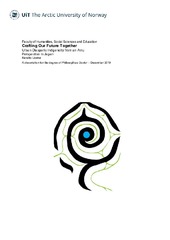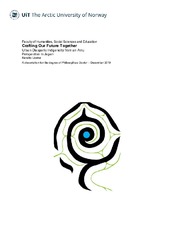| dc.contributor.advisor | Nyseth, Torill | |
| dc.contributor.author | Uzawa, Kanako | |
| dc.date.accessioned | 2020-01-22T13:19:25Z | |
| dc.date.available | 2020-01-22T13:19:25Z | |
| dc.date.issued | 2020-02-21 | |
| dc.description.abstract | This dissertation discusses living experiences and stories of urban Ainu youth, Indigenous people of Japan in the twenty-first century. I have weaved my own experiences as a Tokyo Ainu into the discussion in order to illustrate forms of Ainu cultural revitalization in cities. In the thesis, I ask: What attributes in cities facilitate the process of Ainu cultural revitalization? The dissertation investigates Ainu living experiences in the cities of Tokyo and Sapporo by introducing the concept of urban diasporic Indigeneity as an analytical tool to conceptualize contemporary Ainu lifestyles in cities.
The dissertation is based on three publications. Firstly, I set out to investigate how Ainu culture comes into life in Tokyo with a focus on the Ainu restaurant Rera Cise (House of Wind). This is done through various cultural practices of food culture, dance, and most importantly, sharing experiences. The dissertation later expands the discussion of Ainu cultural revitalization in cities to social encounters between Ainu and Wajin (Wajin refers to people of non-Ainu ethnicity) youth, with the case study of Sapporo University Urespa club. I argue that Urespa is a social venture that transforms individual and collective values of Ainu people and Ainu culture into more positive experiences. Lastly, the dissertation discusses the bonding of Ainu and Wajin youth together through Ainu cultural practices within Urespa. The main findings of the dissertation are (1) Ainu cultural revitalization goes beyond the boundary between the Ainu and Wajin relations, and (2) geographical locations do not limit the possibilities for Ainu cultural revitalization. Findings in my research indicate that Ainu culture is still alive, and continues to be carried forward with new inspiration and vision for the future. | en_US |
| dc.description.doctoraltype | ph.d. | en_US |
| dc.description.popularabstract | This dissertation discusses living experiences and stories of urban Ainu youth, Indigenous people of Japan in the twenty-first century. I have weaved my own experiences as a Tokyo Ainu into the discussion in order to illustrate forms of Ainu cultural revitalization in cities. In the thesis, I ask: What attributes in cities facilitate the process of Ainu cultural revitalization?
I was born in Tomakomai, Hokkaido, dwelling in both cities and in the small community of Nibutani, Hokkaido where I spent all my school holidays with my grandparents and cousins. Though I was often surrounded by Ainu culture and its environment in Hokkaido, I was mainly raised within the context of Wajin (Wajin refers to people of non-Ainu ethnicity) culture until my early twenties, when I was introduced to the Tokyo Ainu community. I cherish my experiences in the Tokyo Ainu community and Nibutani, which constitutes who I am today. From the Nibutani community, all the memories of smell and taste from wet rice fields, the forest, the rivers, the salmon, the delicious water I tasted in the mountain, and the Ainu dance I danced together with locals, are embedded in my body. My experiences with the Tokyo Ainu community reconnected me to the Nibutani community, where I began to recognize the Tokyo Ainu community as my home. This connection still lives in my heart and helps me in my daily struggles and challenges. The dissertation investigates Ainu living experiences in the cities of Tokyo and Sapporo by introducing the concept of urban diasporic Indigeneity as an analytical tool to conceptualize contemporary Ainu lifestyles in cities.
The dissertation is based on three publications. Firstly, I set out to investigate how Ainu culture comes into life in Tokyo with a focus on the Ainu restaurant Rera Cise (House of Wind). This is done through various cultural practices of food culture, dance, and most importantly, sharing experiences. The dissertation later expands the discussion of Ainu cultural revitalization in cities to social encounters between Ainu and Wajin youth, with the case study of Sapporo University Urespa club. I argue that Urespa is a social venture that transforms individual and collective values of Ainu people and Ainu culture into more positive experiences. Lastly, the dissertation discusses the bonding of Ainu and Wajin youth together through Ainu cultural practices within Urespa. | en_US |
| dc.description.sponsorship | UiT the Arctic University of Norway | en_US |
| dc.identifier.uri | https://hdl.handle.net/10037/17182 | |
| dc.language.iso | eng | en_US |
| dc.publisher | UiT Norges arktiske universitet | en_US |
| dc.publisher | UiT The Arctic University of Norway | en_US |
| dc.relation.haspart | <p>Paper 1: Uzawa, K. (2018). Everyday Acts of Resurgence and Diasporic Indigeneity among the Ainu of Tokyo. In G. Roche, H. Maruyama & Å.V. Kroik (Eds), <i>Indigenous Efflorescence: Beyond Revitalisation in Sapmi and Ainu Mosir</i>. Canberra: ANU Press, Australian National University. Also available at <a href=https://doi.org/10.22459/IE.2018.20> https://doi.org/10.22459/IE.2018.20</a>.
<p>Paper 2: Uzawa K. & Watson, M.K. Urespa (“growing together”): the remaking of Ainu-Wajin relations in Japan through an innovative social venture. (Accepted manuscript). Available in the file “thesis_entire.pdf” and in Munin at <a href=
https://hdl.handle.net/10037/17203>
https://hdl.handle.net/10037/17203</a>. Published in <i>Asian Anthropology</i>, 2020, available at <a href= https://doi.org/10.1080/1683478X.2019.1699599> https://doi.org/10.1080/1683478X.2019.1699599</a>.
<p>Paper 3: Uzawa, K. (2019). What does Ainu cultural revitalisation mean to Ainu and Wajin youth in the 21st century? Case study of Urespa as a place to learn Ainu culture in the city of Sapporo, Japan. <i>AlterNative: An International Journal of Indigenous Peoples, 15</i>(2), 168–179. Also available at <a href=https://doi.org/10.1177/1177180119846665> https://doi.org/10.1177/1177180119846665</a>. | en_US |
| dc.rights.accessRights | openAccess | en_US |
| dc.rights.holder | Copyright 2020 The Author(s) | |
| dc.subject.courseID | DOKTOR-001 | |
| dc.subject | Urban | en_US |
| dc.subject | Indigenous Studies | en_US |
| dc.subject | Ainu Contemporary Studies | en_US |
| dc.subject | Indigenous Methodology | en_US |
| dc.subject | Social Encounter | en_US |
| dc.subject | Multiculture | en_US |
| dc.subject | Hokkaido, Japan | en_US |
| dc.subject | Ainu Studies | en_US |
| dc.subject | Diasporic Indigeneity | en_US |
| dc.subject | Cultural Revitalization | en_US |
| dc.subject | Indigenous people | en_US |
| dc.subject | Transculture | en_US |
| dc.subject | Ethnic Studies | en_US |
| dc.title | "Crafting Our Future Together": Urban Diasporic Indigeneity from an Ainu Perspective in Japan | en_US |
| dc.type | Doctoral thesis | en_US |
| dc.type | Doktorgradsavhandling | en_US |


 English
English norsk
norsk



